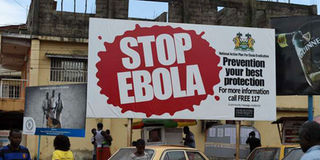Ebola causes impotency and blurry vision: report

A billboard with a message about ebola in Freetown on November 7, 2014. A study of the Ebola Natural History in Liberia has revealed that the disease’s side effects include impotency, protracted period of erection, eye fatigue and blurry vision. PHOTO | AFP
What you need to know:
- Other effects include severe headache, joint and muscle pain and tinnitus - the hearing of sound when no external sound is present.
- The Ebola Natural History Study is a joint Liberia-US joint Clinical Research Partner project, which was launched at the John F. Kennedy Memorial Hospital in Monrovia on June 17, 2015.
- Among other things, it seeks to explain whether survivors can transmit the virus to their household contacts or sexual partners.
DAKAR
A study of the Ebola Natural History in Liberia has revealed that the disease’s side effects include impotency, protracted period of erection, eye fatigue and blurry vision.
Other effects include severe headache, joint and muscle pain and tinnitus - the hearing of sound when no external sound is present.
The study was carried out on cured Ebola patients by Liberia’s Principal medical investigator Dr Mosoka Fallah.
The Liberia News Agency quoted Dr Fallah telling a press conference in Monrovia on Tuesday that a significant number of pregnant survivors are experiencing miscarriages and stillbirths.
FUTURE PREVENTION
The Ebola Natural History Study is a joint Liberia-US joint Clinical Research Partner project, which was launched at the John F. Kennedy Memorial Hospital in Monrovia on June 17, 2015.
It is being implemented by a medical fraternity called ‘Partnership for Research on Ebola Virus In Liberia’ (Prevail).
Dr Fallah explained that the project seeks to unravel the unknowns that are associated with the virus to optimize clinical care.
This, he said, “will provide survivors in Liberia and the world effective prevention and treatment tools against future Ebola outbreaks’’.
The research targets about 1,500 survivors and 6, 000 of their close contacts to be examined by researchers.
IMMUNITY STATUS
Among other things, it seeks to explain whether survivors can transmit the virus to their household contacts or sexual partners.
Furthermore, the study is “designed to determine if survivors are immune or protected from contracting the Ebola virus in the future’’.
He explained that as of Friday, September 18, 2015, a total of 743 people have enrolled in the study.
Out of that number, 663 are survivors, while 80 are their close contacts.
Of this figure, 415 are females, 328 are males, while 25 are children under 12 years old.
The Medical Investigator noted that the participants will be evaluated every six months following the baseline examination and survey for the next five years.




